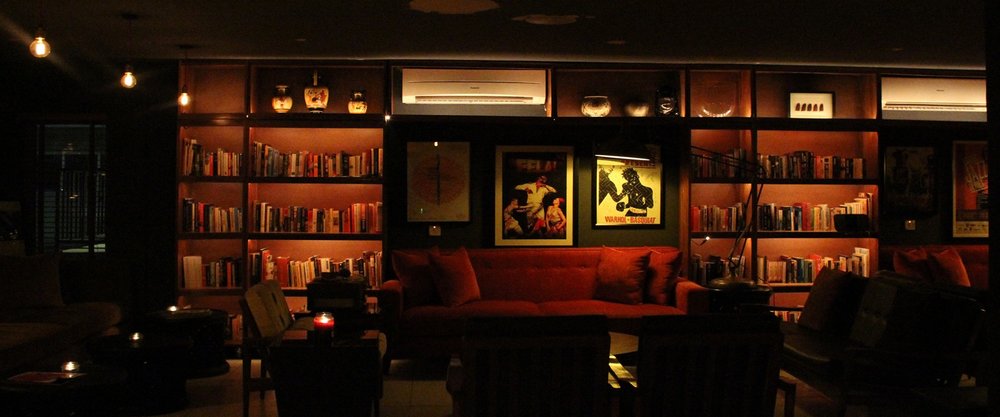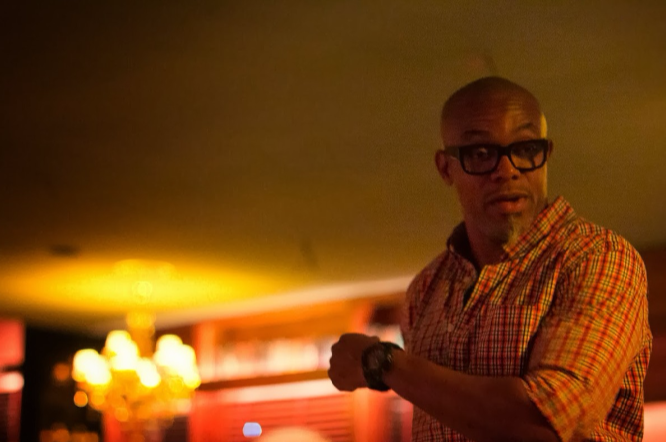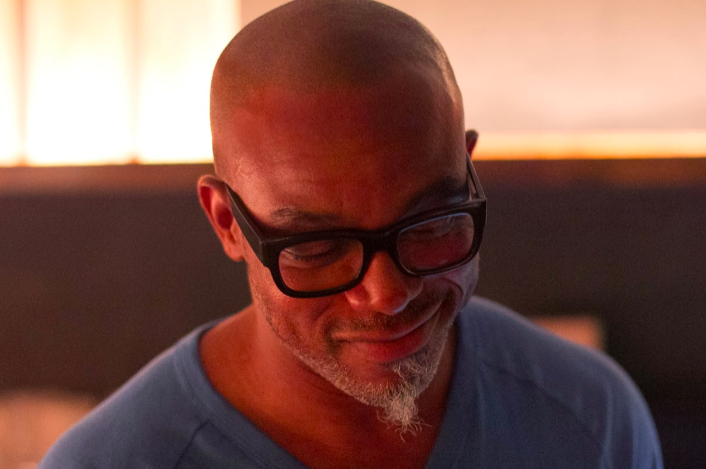Everyone knows Lagos is about the shake.
The megacity is famous - notorious - renowned, in fact - for its hustle. Don’t slow down, don’t stop, don’t hit pause in this town lest you be left in the dust of this creative, economic and social powerhouse.
“Remember, Lagos doesn’t do quiet, man,” says Patrick Koshini, sitting at a softly lit, outdoor bar in the city, Nigerian Highlife playing in the background. “So at the end of the day where do you go to charge your batteries? Where do you go in this city when you want to relate to people who can add to your day, who can add to your knowledge?”
Enter Patrick's private, members-only lounge, Miliki. The multi-floor space on Victoria Island’s is so carefully-curated - designed for comfort yes, and enjoyment - but also designed to engage and uplift. The dark-staired entrance leads up to rooms splashed in soft yellow light, wood paneling and vintage furniture. Bookshelves are stacked with worn paperbacks and art tomes, old phonographs and classic desk lamps. Framed vintage photographs and Nigerian art line walls - every item is intentional, has a place, has a purpose. The lounge gives way to an outdoor bar that's even more of a reprieve: lush, green, fresh.
“I set up Miliki as an alternative refuge, a haven, in our city of, let’s call it noise. I know I’m not the only one who seeks higher forms of relaxation.”
Located on Victoria Island, Patrick says he built the club, whose membership is growing by the day, for the quiet enjoyment of those seeking alternative forms of leisure. It’s a strictly private, members-only club, though sometimes open to the public for special events. With Nigerian art and culture proudly displayed, Miliki is looking to be a catalyst for cultural and intellectual exploration.
“Miliki is where you can come to meet captains of industry, employers of labor, agents of change,” he says. It’s a place to let off steam, of course, but it’s very intentionally more than that.
Sitting amongst a low hum of conversation, old record players and boom boxes, typewriters and vintage trumpet in a velvet box, Patrick says that living abroad for years forced him to shed his comfort zone around concepts of hospitality, recreation and to put it plainly, fun.
“Moving around in the UK, London especially, allowed me to see different styles of enjoyment - from ravers, to chillers, to punks to Market Square people to the Slow Rangers. And I realized what appealed to my personality was the ‘off beaten track.’ The road less traveled. Because it expanded my horizons - I was learning every day.”
Just as he did, pursuers of the high life tend to start at what Patrick calls the “beginners level” - in London that might look like the Hippodrome, Leicester Square, etc. Big clubs, loud music, mass consumption of basic (and easy to swallow) popular culture. Years in, Patrick ended up at a place called The Globe in Notting Hill - a classic American style speakeasy: no sign at the door, no marketing.
“You knock on the door this heavy Samoan guard with a ring in his ear and a toga answers. He slides the bolt, looks at you, recognizes you or feels you and lets you in. And then you get to see all sorts of people - people from the city to people who are living on let’s call it social welfare,” he reminisces. “But there’s something that bonds them. They’re chilled, they have an uncanny taste of what’s good. The music is part of the ambience, it’s not the reason they’re there. It’s the interaction, it’s the way they socialize, it’s the connection, it’s the different rooms, it’s the conversation. And I started to realize that having a good time was no longer about what I call, “the thumping bass for the human race.” It was more about quality of conversation. Listening to knowledge, to other people’s opinions. What I call self knowledge and self improvement became to me an essential part of having a good time.”
That’s Miliki in a nutshell. Patrick doesn’t claim any special status, but there is a differentiating factor to Miliki in it’s clearly stated goal:
“The formal objective of MILIKI is the provision of facilities and amenities of a private lounge, run on commercial principles, for the purpose of social intercourse of persons connected with or interested in the Arts, Sciences, Design and Social Justice. Relatedly, MILIKI intends to be a stimulus for new thinking and social re-engineering by offering a meeting point to discuss issues that shape our individual and collective progress, our national orientation and society.”
With a club, lounge and small boutique onsite, bartenders in well-tailored, pinstripe lined jackets and shirtsleeves, food and drink and spaces for live music and a beautiful outdoor green space, Miliki is versatile.
“There is no way I’d do a Miliki that didn’t have a garden. What does a garden do? It calms. In an urban setting, a concrete jungle, green does a lot for the mind. I need green, green needs us.”
Beyond the garden, there are plans to expand the space to create a cigar lounge, three further private lounges for “privacy within the privacy,” and another larger lounge with a dedicated space for plug and play music performances.
“So come in and enjoy music, relax, sitting down, food, drinks. This is not a 20 people on a square foot kind of space. That’s the physical and mental allowance necessary for you to take in the music and just experience.”
Music is key for Patrick, whose father was a church singer, and who had a deep relationship with vinyl. On weekends, his father would come downstairs “in his singlet, as they called it those days,” and his slippers, blasting records, early in the morning.
“He had a huge collection. Starley Carmichael - if you want philosophy, black civil rights, all the way down to Tuju Yelano, The Redemptions, reggae, roots, Highlife, funk, soul, he had everything man.”
His father would label each song: heavy funk, deep funk, giving each one a classification. That provided a structural education, a roadmap of styles and eras, and an open-mindedness to sound that would eventually lead to the beautiful mish-mash of music one can now hear at Milki.
There’s a clear connection between Patrick and his father’s way of being - a desire to dig, to understand, to classify, to explore. Watch for Miliki - it’s grows and evolves and expands, just as its’ owner strives to do in his daily life, and in his curation of the space. But you’ll have to do your own digging.
“We’re quiet, organic, word of mouth. I let the people who come here tell the truth about what they see. I can sing different songs, but one sentence of truth will cut through all my songs.”
More on Miliki here, where you can try your hand at an application if you're in Lagos.
Patrick Koshini portraits c/o Miliki
All other images c/o Globetrotter Magazine





